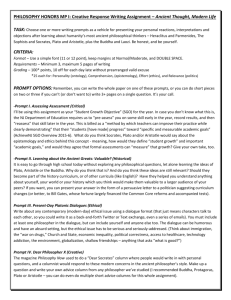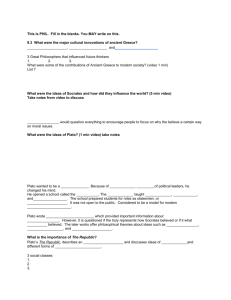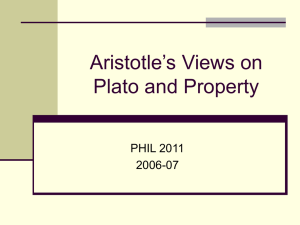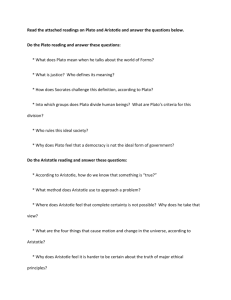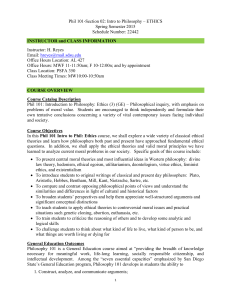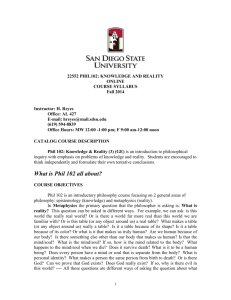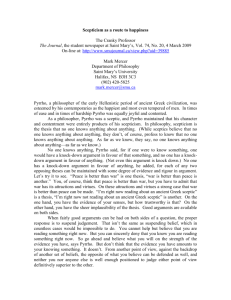Phil 411 Ancient Western Philosophy (Reyes) (F 2013)
advertisement
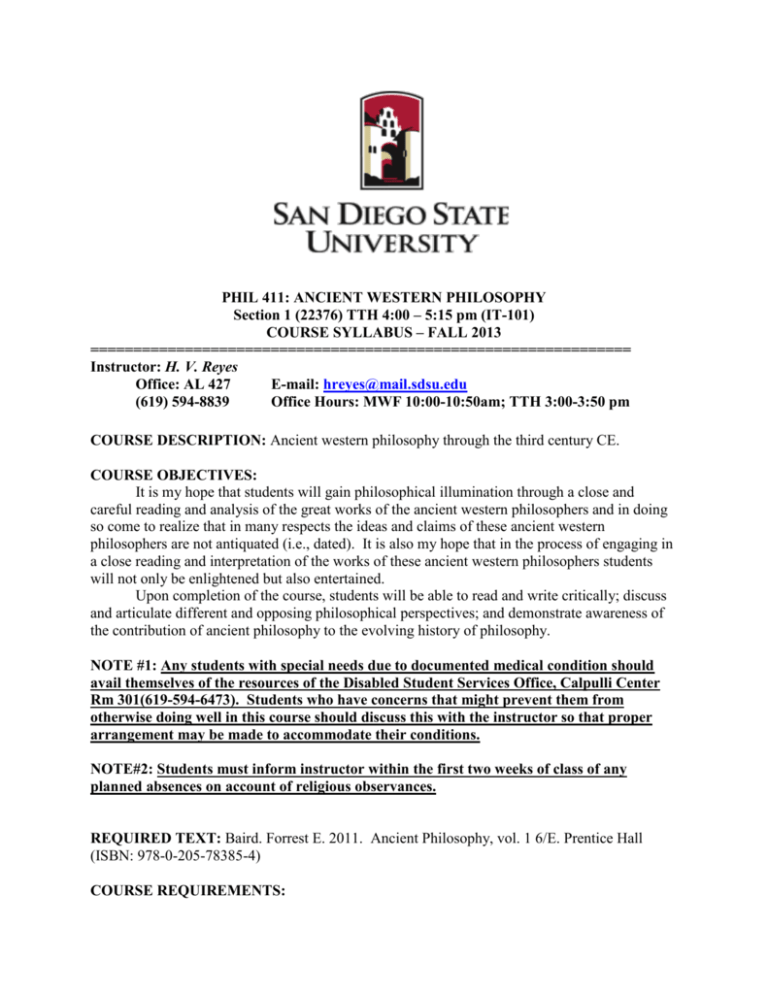
PHIL 411: ANCIENT WESTERN PHILOSOPHY Section 1 (22376) TTH 4:00 – 5:15 pm (IT-101) COURSE SYLLABUS – FALL 2013 =============================================================== Instructor: H. V. Reyes Office: AL 427 E-mail: hreyes@mail.sdsu.edu (619) 594-8839 Office Hours: MWF 10:00-10:50am; TTH 3:00-3:50 pm COURSE DESCRIPTION: Ancient western philosophy through the third century CE. COURSE OBJECTIVES: It is my hope that students will gain philosophical illumination through a close and careful reading and analysis of the great works of the ancient western philosophers and in doing so come to realize that in many respects the ideas and claims of these ancient western philosophers are not antiquated (i.e., dated). It is also my hope that in the process of engaging in a close reading and interpretation of the works of these ancient western philosophers students will not only be enlightened but also entertained. Upon completion of the course, students will be able to read and write critically; discuss and articulate different and opposing philosophical perspectives; and demonstrate awareness of the contribution of ancient philosophy to the evolving history of philosophy. NOTE #1: Any students with special needs due to documented medical condition should avail themselves of the resources of the Disabled Student Services Office, Calpulli Center Rm 301(619-594-6473). Students who have concerns that might prevent them from otherwise doing well in this course should discuss this with the instructor so that proper arrangement may be made to accommodate their conditions. NOTE#2: Students must inform instructor within the first two weeks of class of any planned absences on account of religious observances. REQUIRED TEXT: Baird. Forrest E. 2011. Ancient Philosophy, vol. 1 6/E. Prentice Hall (ISBN: 978-0-205-78385-4) COURSE REQUIREMENTS: 1. Attendance and Participation (in-class and on-line): Because of the nature of the course and the structure by which it is conducted, it is imperative for the students to attend each class on time. It will be to your benefit to avoid unnecessary absences as such absences drastically affect your appreciation and understanding of the materials discussed as well as your performance in the exams. To be prepared for each class and actively participate in class activity. You will have (or at least have tried to) read and thought about the assigned reading before each class. Be sure to bring the assigned text or handout with you to class. Active participation requires that you follow closely the on-going class discussion, think of the questions asked and answers offered even if you are not the one asked. Keep in mind that you are a major participant to the philosophical conversation going on in class. On-line class participation will be through the Blackboard Discussion Board. For every major reading assigned, you will be asked to answer some questions based on the reading, or make comments about some passages taken from the reading, or participate in a group discussion or activity. 2. 3 Major Exams: These are announced/scheduled hour-long essay exams. One week before the scheduled quiz (to give focus and direction in your preparation) you will be provided with guide questions from which the quiz questions will be chosen at random. Please refer to the course outline section of this handout for the dates of the quizzes. 3. Final Exam: This is a comprehensive essay exam, covering all the philosophers discussed in the course. GRADING POLICY: Your final grade will be based on the following distribution of points: 60 % -------------------- 3 Major Exams 20 % -------------------- Online Discussion Board 20 % -------------------- Final Exam 100 % ------------------ Final Grade Your letter grade will be based on the following scale: 96 – 100 ---------- A 76 – 79 ----------- C+ 90 - 95 ----------- A73 – 75 ----------- C 86 – 89 ----------- B+ 70 – 72 ----------- C83 – 85 ----------- B 66 – 69 ----------- D+ 80 – 82 ----------- B60 – 65 ----------- D Anything below 60 is an F. COURSE SCHEDULE: Week #1 (8/27; 8/29) Introduction Get acquainted, class orientation, discuss course requirements, etc. Assignment for Week #2: Read the Milesians (pp, 8-13) Week #2 (9/3; 9/5): The Milesians Discuss Thales, Anaximande, Anaximenes Assignment for Week #3: Read Three Solitary Figures (pp.14-21) Week #3 (9/10; 9/12): Three Solitary figures Discuss Pythagoras, Xenophanes, Heraclitus ODB #1 DUE: THURSDAY, 9/12 Assignment for Week #4: Read the Monists (pp. 22-30) Week #4 (9/17; 9/19): The Monists Discuss Parmenides, Zeno of Elea ODB#2 DUE: THURSDAY, 9/19 Assignment for Week #5: Read the Pluralists (pp. 31-42) - Review for Major Exam #1 Week #5 (9/24; 9/26): The Pluralists Discuss Empedocles, Anaxagoras, Democritus and Leucippus MAJOR EXAM #1: THURSDAY, 9/26 Assignment for Week #6: Read the Sophists (pp. 43-48) Week #6 (10/1; 10/3): The Sophists Discuss Protagoras, Gorgias, Critias Assignment for Week #7: Read Euthyphro, Apology, Crito (pp. 70-107) Week #7 (10/8; 10/10): Socrates Discuss Socrates ODB #3 DUE: THURSDAY, 10/10 Assignment for Week #8: Read Plato’s Phaedo, Meno, Symposium (pp. 108-199) Week #8 (10/15; 10/17): Plato Discuss Plato ODB #4 DUE: THURSDAY, 10/17 Assignment for Week #9: Read Plato’s Republic, Parmenides, Theaetetus, Timaeus, Laws (pp. 199-314) Week #9 (10/22; 10/24): Plato Continue to discuss Plato ODB #5 DUE: THURSDAY, 10/24 Assignment for Week #10: Read Aristotle’s Categories, Physics, Metaphysics (pp. 319371) - Review for Major Exam #2 Week #10 (10/29; 10/31): Aristotle Discuss Aristotle MAJOR EXAM #2: THURSDAY, 10/31 Assignment for Week #11: Read Aristotle’s selections: On the soul, Ethics, Politics (pp. 371-450) Nicomachean Week #11 (11/5; 11/7): Aristotle Continue to discuss Aristotle ODB #6 DUE: THURSDAY, 11/7 Assignment for Week # 12: Read Epicurus (pp. 469-490) Week # 12 (11/12; 11/14): Epicurus Discuss Epicurus Assignment for Week #13: Read Lucretius and the Early Stoa (pp. 492-504; pp.507517) Week # 13 (11/19; 11/21): Lucretius and Zeno of Citium Discuss Lucretius Discuss Zeno of Citium Assignment for Week 14: Read Epictetus, Marcus Aurelius (pp. 519- 539); and Sextus Empiricus (pp.541-545) - Review for Exam #3 Week #14 (11/26): MAJOR EXAM #3: TUESDAY, 11/26 THANKSGIVING RECESS (11/28-11/29) – NO CLASS Week #15 (12/3; 12/5): Epictetus, Marcus Aurelius, Pyrrho, Sextus Empiricus Discuss Epictetus Discuss Marcus Aurelius Discuss Pyrrho Discuss Sextus Empiricus 12/10: Last day of regular class; distribute pre-final grade FINAL EXAM: TUESDAY, DEC. 12 – 3:30-5:30 pm Pyrrho

